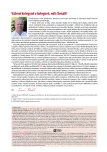Bevacizumab in Treatment of Metastatic Breast Cancer: Case Report
Authors:
Marta Holíková
Authors‘ workplace:
Komplexní onkologické centrum a oddělení klinické onkologie, Krajská nemocnice Liberec, přednosta a primář MUDr. Jiří Bartoš, MBA
Published in:
Prakt Gyn 2013; 17(2): 161-162
Category:
Oncogynecology: Case report
Overview
Metastatic breast cancer is incurable disease, but the new therapeutic options reduce complaint of patient, extend time to progression and extend the overall survival. Undesirabels effects are often concomitant with chemotherapy and during the treatment chemoresistance develops. A new chance of treatment is combination of chemotherapy with targeted treatment. The vascular endothelial growth factor (VEGF) is the main regulator of angiogenesis. Humanized monoclonal antibody antiVEGF – bevacizumab is evidenced with efficiency in series of cancer diseases. The case report presents our experience of the combined treatment of bevacizumab with chemotherapy at patient with chemoresistant triple negative breast cancer.
Key words:
angiogenesis – antiangiogenic therapy – bevacizumab – metastatic breast cancer
Sources
1. Hanahan D, Weinberg RA. The hallmarks of cancer. Cell 2000; 100(1): 57–70.
2. Gray R, Bhattacharya S, Bowden C et al. Independent Review of E2100: A Phase III Trial of Bevacizumab Plus Paclitaxel Versus Paclitaxel in Women With Metastatic Breast Cancer. J Clin Oncol 2009; 27(30): 4966–4972.
3. Miles DW, Chan A, Dirix LY et al. Phase III Study of Bevacizumab Plus Docetaxel Compared With Placebo Plus Docetaxel for the First-Line Treatment of Human Epidermal Growth Factor Receptor 2-Negative Metastatic Breast Cancer. J Clin Oncol 2010; 28(20): 3239–3247.
4. Robert NJ, Diéras V, Glaspy J et al. RIBBON-1: randomized, double-blind, placebo-controlled, phase III trial of chemotherapy with or without bevacizumab for first-line treatment of human epidermal growth factor receptor 2-negative, locally recurrent or metastatic breast cancer. J Clin Oncol 2011; 29(10): 1252–1260. Dostupné z DOI: <http://doi: 10.1200/JCO.2010.28.0982>.
5. O‘Shaughnessy J, Miles D, Gray RJ et al. A meta-analysis of overall survival data from three randomized trials of bevacizumab (BV) and first-line chemotherapy as treatment for patients with metastatic breast cancer (MBC). 2010 ASCO Annual Meeting. J Clin Oncol 2010; 28(15 Suppl): abstr. 1005.
6. Miles DW, Romieu G, Dieras V et al. Meta-analysis of patients (PTS) previously treated with taxanes from three randomized trials of bevacizumab (BV) and first-line chemotherapy as treatment for metastatic breast cancer (MBC). Annals of Oncology 2010; 21(Suppl 8: Abstract Book of the 35th ESMO Congress): abstr. 279PD.
7. O‘Shaughnessy J, Romieu G, Diéras V et al. Meta-Analysis of Patients with Triple-Negative Disease from Three Randomized Trials of Bevacizumab (BV) and First-Line Chemotherapy as Treatment for Metastatic Breast Cancer (MBC). San Antonio Breast Cancer Symposium 2010. Cancer Research 2010; 70(24 Supplement 2): abstr. P6–12–03. Dostupné z DOI: < http://doi: 10.1158/0008–5472.SABCS10-P6–12–03>.
Labels
Paediatric gynaecology Gynaecology and obstetrics Reproduction medicineArticle was published in
Practical Gynecology

2013 Issue 2
Most read in this issue
- Repeated sectio caesarea, over and over: case report
- Guidelines for the thyroid diseases diagnosis and management in pregnancy and women with fertility disorders
- Complications after ovarian stimulation in vitro fertilization require admission to surgery
- Myoinositol – new possibility in treatment of polycystic ovary syndrome
